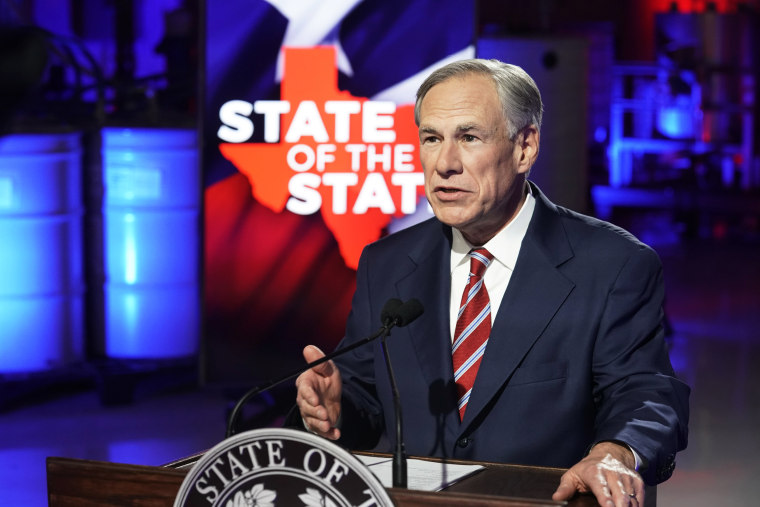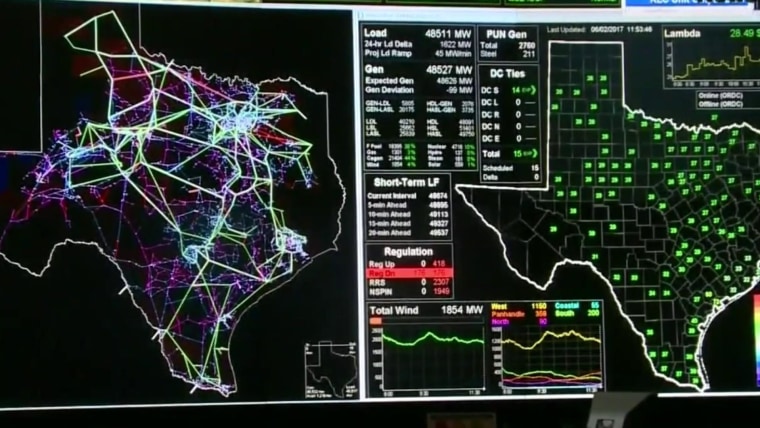Natural gas, the state's dominant energy source, has provided drastically less energy than expected, according to experts and industry data.
 Texas Gov. Greg Abbott prepares to deliver his State of the State speech in Lockhart on Feb. 1, 2021.Bob Daemmrich / AP file
Texas Gov. Greg Abbott prepares to deliver his State of the State speech in Lockhart on Feb. 1, 2021.Bob Daemmrich / AP fileBy Kevin Collier
Almost immediately after winter storms and extreme cold temperatures first swept through Texas last Thursday and left millions of residents without power, prominent conservative politicians and media personalities began to blame renewable energy.
And while frozen wind turbines have contributed to the state's energy crisis, that type of energy has only slightly underperformed against published expectations for winter output. Natural gas, the state's dominant energy source, has provided drastically less energy than expected, according to experts and industry data.
"Wind was operating almost as well as expected," said Sam Newell, head of the electricity group at the Brattle Group, an energy consulting company that has advised Texas on its power grid.
"It's an order of magnitude smaller" than problems with natural gas, coal and nuclear energy, he said.
Efforts to pin the ongoing crisis on renewable energy gained steam in recent days. Fox News host Tucker Carlson devoted an entire segment to the claim Monday night, which didn't mention gas failures but did blame Texas' expansion into wind energy for deaths in the state.
Texas Gov. Greg Abbott described the troubles processing and delivering natural gas in such extreme cold in an interview Tuesday with the local Dallas station WFAA. But when Abbott went on Fox News to talk about the disaster, he zeroed in on the Green New Deal, a progressive plan that proposes massive investment in renewable energy.
Without mentioning any troubles with natural gas, he said that "our wind and our solar got shut down and they were collectively more than 10 percent of our power grid," and "that thrust Texas into a situation where it was lacking power."

Understanding how Texas' energy grid broke down during winter storm
The politicization of the Texas crisis underscores the ongoing battle between Republicans and Democrats over how to address climate change, as well as previous battles over the energy industry. When California faced energy issues in August related to a heat wave, many Republicans including Texas politicians pointed to it as an example of Democratic mismanagement.
Now, Texas is under the microscope, with experts pointing to the state's deregulated energy grid (and its lack of cold weather preparation) as the culprits.
Data from Texas makes clear that renewable energy failures have played only a small part in the crisis.
The Electric Reliability Council of Texas, which plays the role of traffic cop for Texas' energy providers, directing energy from producers to distributors, predicted that this winter would see wind produce about 7,070 megawatts at peak load times. By the council's own daily figures, wind power in Texas has produced between 4,415 and 8,087 megawatts at peak times since the storm began.
By contrast, the state's "thermal fleet" — mostly natural gas, but also including coal and nuclear power — has been down significantly more, leading to a shortfall of 30,000 megawatts, the council told the local news outlet WKYC.
About 56 percent of Texas' energy comes from natural gas, just under 24 percent comes from wind, 19 percent from coal, and almost 9 percent from nuclear energy.
"About a third of our thermal fleet is offline," said Joshua Rhodes, a research associate at the University of Texas in Austin who specializes in the power grid. "We typically count on about 90 percent of it being available during a peak event."
"From freezing gas wells and gas lines, to depressurization of our natural gas infrastructure because so many homes and businesses are calling for gas at the same time, we just don't have enough fuel," he said.
That has not stopped many Republican politicians from pointing to the crisis as a reason to oppose broader climate efforts.
Several House Republicans who vocally oppose the Green New Deal, including Rep. Dan Crenshaw from Texas, Rep. Andy Barr from Kentucky, and Rep. Lauren Boebert from Colorado, have tweeted that the legislation would lead to situations like what Texas is dealing with now.
There are challenges to renewable energy as the country's primary or sole power source, but experts say advances in batteries and other technologies are making it more feasible.
Rhodes said that accepting scientists' findings on climate change will be key to avoiding similar disasters in Texas in the future.
"The science is telling us we're going to have more variability in our weather," he said. "In Texas, when we think of more variability in our weather, we usually think of hotter, drier summers, but it goes the other way, as well."
No comments:
Post a Comment